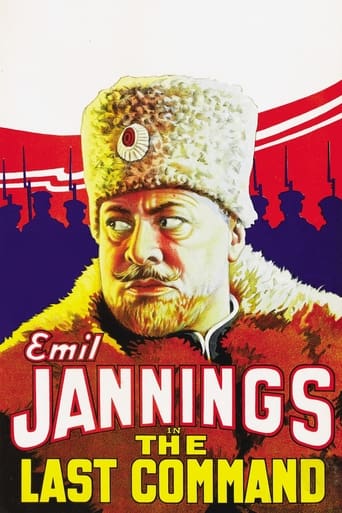


The Last Command
A former Imperial Russian general and cousin of the Czar ends up in Hollywood as an extra in a movie directed by a former revolutionary.
-
- Cast:
- Emil Jannings , Evelyn Brent , William Powell , Nicholas Soussanin , Fritz Feld , Harry Cording , Guy Oliver


Similar titles
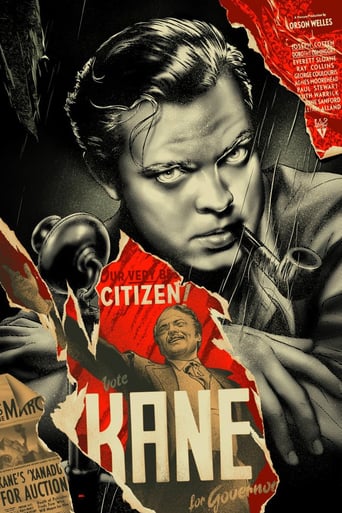
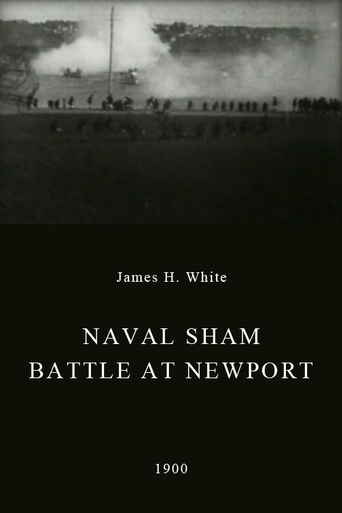
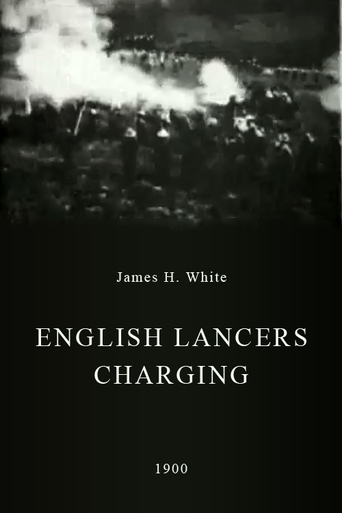

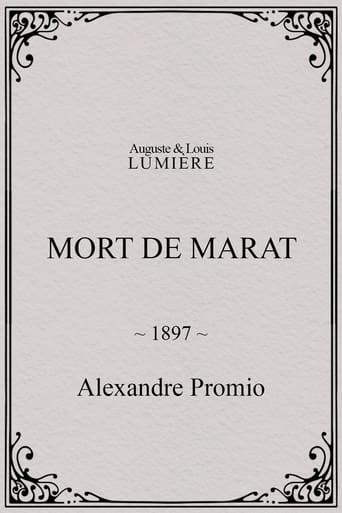


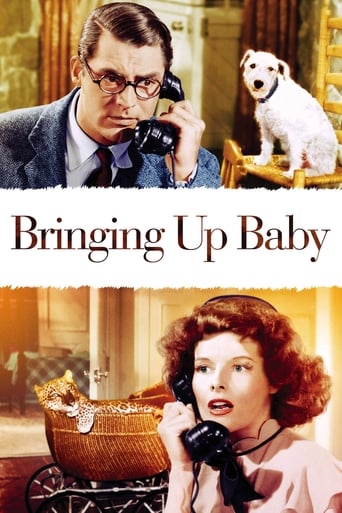

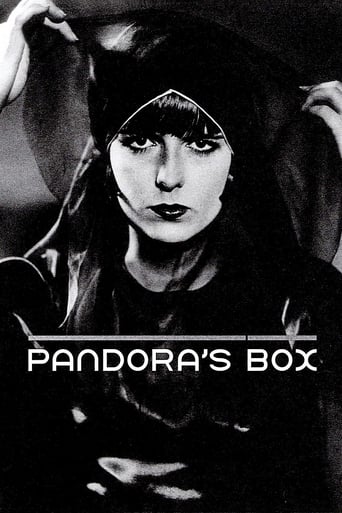
Reviews
Wonderful character development!
Blending excellent reporting and strong storytelling, this is a disturbing film truly stranger than fiction
The movie's neither hopeful in contrived ways, nor hopeless in different contrived ways. Somehow it manages to be wonderful
There is, somehow, an interesting story here, as well as some good acting. There are also some good scenes
Sure the absence of spoken dialogue, flimsy sets and obvious miniatures mark this movie as an antique, but it does grab you. It is easy to disregard the antique technical aspects of the film, but the psychology of the protagonists are equally out of date. Did people in 1928 swallow the unlikely behavior of the protagonists as reflecting real life or did they see it as necessary plot components of a fantasy. I suspect the latter.William Powell was most naturalistic in his acting. He played a calculating, humorless, dictatorial movie director. The antithesis of Nick Charles. Jannings got a chance to strut his famous histrionics, and he puts on quite a show. Brent could be a smoldering Garbo one minute and a Joan Crawford flapper the next. Her behavior was designed for script purposes and did not simulate any fully fleshed out character.Director Joseph von Sternberg (nee Jonas Sternberg)and Jannings reached their career heights with The Blue Angel two years later. Von Sternberg could really stretch out a quiet, actionless scene and fill it with tension. He was successful in Hollywood for a while and then his career crashed. Jannings became a Nazi in Germany and slid into obscurity and early death after WWII.The movie can be gripping. It is well done, but the characters are acting out a movie style fantasy that is not longer palatable. I couldn't suspend my disbelief. Hey, times change.
"The Last Command" is a beautiful and extraordinary film in the best tradition of classic story-telling, with German actor Emil Jannings giving an outstanding performance for which he won the first Oscar for "Best Actor" ever. Based on the life of Russian official Theodore Lodijensky, who ran from the Soviet revolution and worked in Hollywood as an extra in silent films, Jannings plays a general who is chosen for a big historical production by a fellow countryman, a theater director who he once persecuted in Russia, for his subversive activities, and who is now in charge of the film's direction. From the first scenes when the military is selected, when he arrives in the studio, dons his costume and makes up, to the scene he impressively plays in the film-within-the-film (containing one of the most eloquent critics to cinema when turned into a cold industry that makes either films as sausages or limousines), "The Last Command" consists of a long flashback of the general's life in Russia, when he incarcerated the theater director and fell in love with a revolutionary actress. Jannings would work again for Sternberg as the protagonist of "The Blue Angel", seduced by the wicked Lola-Lola (Marlene Dietrich). Highly recommended.
The Last Command, was inspired by a true story sort of. Legendary director Ernst Lubitsch was invited by a friend to dinner at a Russian restaurant where he was introduced to the owner, one General Lodijenski. This General had fought in World War I, but lost an important battle and fled west shortly afterwards opening a restaurant called The Double Eagle on Sunset Boulevard.Several months later, Lubitsch was at MGM working on The Student Prince in Old Heidelberg when he noticed an extra in costume of a Russian General. "I know you from somewhere," said Lubitsch. "I met you before," the extra replied. "I am General Lodijenski." Turns out his restaurant had closed and he was forced to now take extra work in the movies. "Funny, isn't it," he said, "that I should be playing a walk-on bit as a Russian general."Mulling the encounter over, Lubitsch began to see it as a perfect scenario for Emil Jannings, whose gift for portraying tragic, masochistic characters had long since been established. Lubitsch told the story to Jannings, who expressed interest. A few weeks later, Lubitsch ran into writer Lajos Biro, who mentioned that Jannings was not only a brilliant actor but had good story ideas as well. Biro then proceeded to tell Lubitsch about the script he was working on, at that point entitled The General. It was the same story Lubitsch had told Jannings.The script was written and given to Josef von Sternberg to direct. Sternberg made some brilliant changes to frame the main story as a flashback, giving the narrative a quality of retrospection, with the implications of loss from the beginning. It was re-titled, The Last Command and what happened to General Lodijenski? He was given a small part in the film and I am told he can be observed as a thick-set, middle-aged man with short hair.Now we have the seeds of the story, a Russian General once a cousin to the Czar ends up a mere extra in a movie about a Russian General – irony. But there is much more irony, the symbolism of the peasants being mistreated by those above them is the same as the extras being mistreated by the Hollywood elite. The films star, Emil Jannings was a Swiss born actor known for portraying imposing historical figures like Henry 8th, Othello, Louis the 15th and Nero. In the mid-1920's many considered him the world's greatest screen actor. He was often cast in films designed to showcase his gift for tragedy as in F.W. Murnau's 1924 feature THE LAST LAUGH where Jannings played a proud but aged hotel doorman who is demoted to restroom attendant. Or the silent version of FAUST made in 1926 where he played Mephistopheles. The Last Command was his 57th film silent and later his first talkie, THE BLUE ANGEL also directed by Josef von Sternberg was a huge international hit and made a star out of Marlene Dietrich.When I recently re-watched this film I was amazed to see this old, feeble and broken man shaking beneath the weight of his memories juxtaposed against him as he was young, virile handsome commanding an entire army as well as every room he entered.Notice the tenderness the director pulls out of this gentleman when he explains why he shakes, because he had a great shock once and then we look with him into a mirror that leads us back to the story of a once great man. In the flashback we see William Powell and Evelyn Brent as revolutionary spies pretending to be actors. Evelyn Brent was a dark haired beauty with sultry looks that led to her being typecast exotic, dangerous roles as a sex addict who did drugs everyday. Her break thru role was as an alcoholic in the play THE RUINED LADY. Just before tonight's film she had made UNDERWORLD in 1927 with the same director Josef von Sternberg, it is considered the first major gangster film. On a trivia note her husband's name was Harry Fox for whom the foxtrot dance was named for.William Powell was one of the most popular leading men in Hollywood for over four decades but I bet you didn't know he started in silent films mostly playing heavies and bad guys! In his first film he was a criminal to John Barrymore's SHERLOCK HOLMES in 1922! LAST COMMAND was his 27th silent film and before this he was never a top star but on the strength of his reviews from this feature he was soon cast as the lead role in a talkie called THE CARNARY MURDER CASE where he played Philo Vance, a detective. He was so good in it he never played a bad guy again. Unlike many silent actors, sound boosted Powell's career. He had a fine, sophisticated voice and his stage training and comic timing greatly aided his introduction to sound pictures. He's best remembered today for his work with the charming Myrna Loy in six THIN MAN pictures.The very first Academy Award ever presented was given to Emil Jannings (he received his award early due to the fact that he was going home to Europe before the ceremony) for his performances Best Actor in a Leading Role for: The Last Command (1928) and for The Way of All Flesh (1927). That first year they gave it for the whole years work and not just a single performance. Sadly THE WAY OF ALL FLESH is a lost film so we have nothing to compare it with.Sternberg is best remembered today for his amazing lighting and cinematography of Dietrich but I saw watch the actors eyes in this film and you'll see he was also a director of great performances in amazing stories I do you seek out and enjoy THE LAST COMMAND!
1927, and Hollywood had been on the map as the centre of the cinematic world for a little over a decade. Now that it had become the site of a multi-million dollar industry and the vertically integrated studio system had been established, some of those in the calmer quarters of this film-making factory were taking the time for a little self-reflection. The Last Command, while its heart may be the classic story of a once prestigious man fallen on hard times, frames that tale within a bleak look at how cinema unceremoniously recreates reality, and how its production process could be mercilessly impersonal. It was written by Lajos Biro, who had been on the scene long enough to know.Taking centre stage is a man who was at the time among Hollywood's most celebrated immigrants – Emil Jannings. Before coming to the States Jannings had worked mainly in comedy, being a master of the hammy yet hilariously well-timed performance, often as pompous authority figures or doddering old has-beens. He makes his entrance in The Last Command as the latter, and at first it looks as if this is to be another of Jannings's scenery-chomping caricatures. However, as the story progresses the actor gets to demonstrate his range, showing by turns delicate frailty, serene dignity and eventually awesome power and presence in the finale. He never quite stops being a blustering exaggeration (the German acting tradition knowing nothing of subtlety), but he constantly holds our attention with absolute control over every facet of his performance.The director was another immigrant, albeit one who had been around Hollywood a bit longer and had no background in the European film industry. Nevertheless Joseph von Sternberg cultivated for himself the image of the artistic and imperious Teutonic Kino Meister (the "von" was made up, by the way), and took a very distinctive approach to the craft. Of note in this picture is his handling of pace and tone, a great example being the first of the Russian flashback scenes. We open with a carefully-constructed chaos with movement in converging directions, which we the audience become part of as the camera pulls back and extras dash across the screen. Then, when Jannings arrives, everything settles down. Jannings's performance is incredibly sedate and measured, and when the players around him begin to mirror this the effect is as if his mere presence has restored order.Sternberg appears to show a distaste for violence, allowing the grimmest moments to take place off screen, and yet implying that they have happened with a flow of images that is almost poetic. In fact, he really seems to have an all-round lack of interest in action. In the scene of the prisoners' revolt Sternberg takes an aloof and objective stance, his camera eventually retreating to a fly-on-the-wall position. Compare this to the following scenes between Jannings and Evelyn Brent, which are a complex medley of point-of-view shots and intense close-ups, thrusting us right into the midst of their interaction.As a personality on set, it would seem that Sternberg was much like the cold and callous director played on the screen by William Powell, and in fact Powell's portrayal is probably something of a deliberate parody that even Sternberg himself would have been in on. Unfortunately this harsh attitude did not make him an easy man to work with, and coupled with his focus on his technical resources over his human ones, the smaller performances in his pictures leave a little to be desired. While Jannings displays classic hamming in the Charles Laughton mode that works dramatically, it appears no-one told his co-stars they were not in a comedy. Evelyn Brent is fairly good, giving us some good emoting, but overplaying it here and there. The only performance that comes close to Jannings is that of Powell himself. It's a little odd to see the normally amiable star of The Thin Man and The Great Ziegfeld playing a figure so stern and humourless, like a male Ninotchka, but he does a good job, revealing a smouldering emotional intensity beneath the hard-hearted exterior.The Last Command could easily have ruffled a few feathers in studio offices, as tends to happen with any disparaging commentary on the film-making process, even a relatively tame example like this. At the very least, I believe many studio heads would have been displeased by the "behind-the-scenes" view, as it threatened the mystique of movie-making which was still very much alive at this point. As it turned out, such was the impact of the picture that Jannings won the first ever Academy Award for Best Actor, as well as a Best Writing nomination for Lajos Biro and (according to some sources, although the issue is a little vague) a nomination for Best Picture. This is significant, since the Academy was a tiny institution at this time and the first awards were more than ever a bit of self-indulgent back-slapping by the Hollywood elite. But elite or not, they recognised good material when they saw it, and were willing to reward it.
